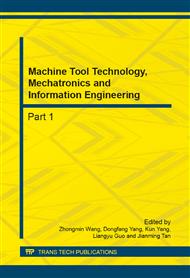p.2755
p.2759
p.2763
p.2768
p.2772
p.2776
p.2784
p.2788
p.2793
Collaboration Research on Web 2.0
Abstract:
Web 2.0 provides richer user experiences by allowing online collaboration and sharing among users. We gleaned from science citation index expanded (SCI-EXPANED) and Social Sciences Citation Index (SSCI) database on web of science, concerning advances in collaboration research in Web 2.0. The result indicates that the number of citation literature on this topic mainly distributes in recent 7 years, reaching climax of 4 in 2012. The main research territory is China, accounting for 22.222%. Accordingly the organization is city univ Hong Kong. And from the analysis of research area, research on information science library and computer science account for more than 50%. Overall, the related research topics can be classified into Web 2.0 in education, Web 2.0 in research, collaborative product development, climate reconstruction, public value in E-Government.
Info:
Periodical:
Pages:
2772-2775
Citation:
Online since:
September 2014
Authors:
Keywords:
Price:
Сopyright:
© 2014 Trans Tech Publications Ltd. All Rights Reserved
Share:
Citation:


